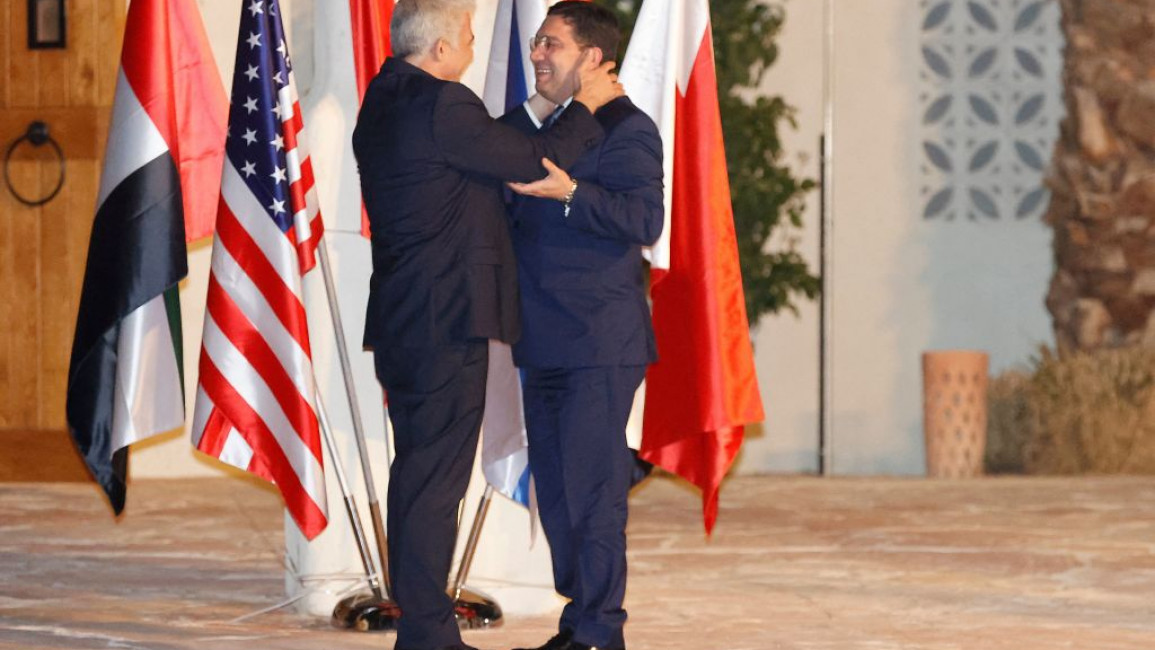'Normalisation is Betrayal': Morocco official's first visit to Israel sparks public backlash
Moroccan foreign minister Nasser Bourita's first official visit to Israel and participation in the Negev summit triggered a growing public backlash in the Moroccan kingdom on Monday.
The venue for the foreign ministers' meeting is Sde Boker, a desert resort where the signatories of the Abraham Accords and Egypt will discuss various security issues in the region with their Israeli and US counterparts. It is expected that Iran will top the agenda.
Bourita's trip marks the first Moroccan official visit to the Israeli state since Rabat joined the Abraham Accords in 2020.
Under the Arabic hashtags "normalisation is betrayal" and "Naqab summit", numerous Moroccan activists and citizens condemned the Kingdom's participation in the Arab-Israeli gathering.
"Why do some voices in Morocco, authorised or not, continue to deny the fact that Morocco has indeed abandoned its "sacred Palestinian cause" to become Israel's protege? This is a fact confirmed by this type of "meetings" and several public and secret agreements," Moroccan journalist Ali Lmrabet tweeted in French.
Other Moroccan citizens joined the campaign by tweeting "Bourita does not represent me" and emphasised their support for the Palestinian cause.
صحيح أن بوريطة يمثل المغرب كدولة في هذه المائدة... ولكن كمواطن مغربي بوريطة لا يمثلني .#مغاربة_ضد_التطبيع #بوريطة_لا_يمثلني pic.twitter.com/fa1riKSKsa
— يــوسُـف-ⵢⵓⵙⵓⴼ (@youssef21096) March 27, 2022
Two years since the formal announcement of normalisation with Tel Aviv, befriending the Israeli state remains a controversial issue in Morocco.
In December 2020, Rabat normalised ties with Tel Aviv in a brokered deal that guaranteed the US to recognise Morocco's sovereignty over the disputed territory of Western Sahara.
The Moroccan Kingdom sealed the deal as a "bold diplomatic move" to gain international recognition of Rabat's "historical right" in the territory, which Algeria-backed separatist movement Polisario Front also claims sovereignty over.
Several pro-Palestinian Moroccan movements have grudgingly accepted the state's justifications over normalisation, including the Islamist party Justice and Development, as its previous chief Saad Eddine El Othmani personally attended the signing ceremony of Abraham Accords as Morocco's then-prime minister.
As the summit will focus on Iran, the Moroccan foreign minister is expected to bring up his country's case against the Iranian state at the summit.
A diplomatic crisis erupted between Tehran and Rabat in 2018, when Morocco accused Iran of using the Lebanese Hezbollah party to train Polisario Front separatist fighters in Western Sahara. An accusation both Tehran and Hezbollah denied.
Earlier this year, Rabat renewed its accusation against Tehran.
Mehdi Rais, a Moroccan diplomatic expert, said that the Islamic Republic's cosy relations with Algeria, which backs the Polisario Front, are worrying Rabat.
"Iran might use training programs for the Polisario to attack sensitive areas in the kingdom, following the same approach of the Tehran-backed Houthis [in their] attacks on Saudi Arabia and the Emirates," Rais told The New Arab.
At the end of his speech in the press conference that followed the summit, Bourita said to his counterparts, "I hope that we meet in another Sahara newt time but with the same spirit."
#ناصر_بوريطة في ختام كلمته في قمة النقب:
— Fatiha Ouali 🇲🇦 فاتحة أوعلي (@fatihaouali1) March 28, 2022
"نأمل أن نلتقي في صحراء أخرى لكن بالروح نفسها" #الصحراء_المغربية pic.twitter.com/Ue6RDTCsYl
The Moroccan foreign minister's last words were interpreted over social media as an invitation of Israel to the disputed territory, as Tel Aviv remains silent regarding the conflict.



